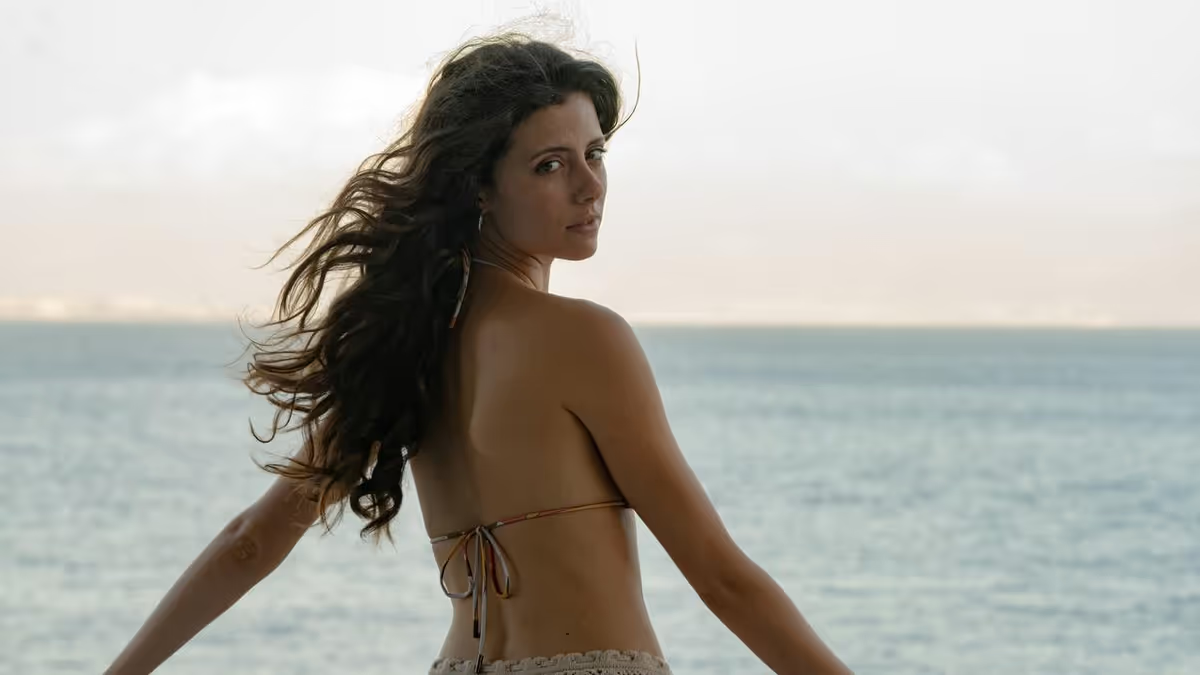In Review: 'Parthenope,' 'Love Hurts'
Paolo Sorrentino's latest pays puzzling homage to the beauty of Naples' past (and beauty in general) while a new action film puts the resurgent Ke Huy Quan front and center

Parthenope
Dir. Paolo Sorrentino
136 min.
The opening minutes of Parthenope supply the first in a series of grand flourishes, as a wealthy shipping magnate called “the Commendatore” (Alfonso Santagata) rides a barge triumphantly into the Bay of Naples in 1950, standing alongside a massive golden canopy bed in the shape of an old carriage—a treasure alleged from Versailles. The sequence calls to mind the whimsy and wonder of a helicopter dangling a statue of Christ over the city of Rome in La Dolce Vita, a primary influence on previous Paolo Sorrentino urban visions like The Great Beauty and Hand of God. In a Sorrentino film, it can be hard to tell if he’s celebrating or decrying such grandiloquence, especially here, where the toothsome stylist who ripped the corruption of public officials in work like Il Divo and HBO’s The Young Pope seems to have clocked out.
The Reveal is a reader-supported newsletter dedicated to bringing you great essays, reviews and conversation about movies. While both free and paid subscriptions are available, please consider a paid subscription to support our long-term sustainability.
The more relevant comparison for Sorrentino is his previous film, The Hand of God, an unconventional and disappointingly lumpy memoir about the Naples of his childhood. Though Parthenope eventually works its way to the present, its vision of Naples mostly predates Sorrentino’s life, which seems to have freed him up to make a film that’s even more abstract in its episodes and more distant from its enigmatic protagonist. Parthenope is his first feature with a woman at its center, though that comes with the big fat asterisk that the prurient gaze of a film like 2015’s Youth, in which Michael Caine and Harvey Keitel gawked at beauties half their age in the Swiss Alps, has mostly been amplified here. That the title is both the protagonist’s name and the name given to Naples by the Greeks in 8th century BC is an indicator of her symbolic, God-like, world-historic hotness.
After a water birth that’s treated like the miracle of Bethlehem, baby Parthenope grows into a stunning object of desire, played by newcomer Celeste Dalla Porta. She’s an unknowable figure by design, which opens up a hole in the middle of the movie, but she’s neither arrogant nor incurious, just in a constant state of trying to figure things out. As a fully blossomed teenager in 1968, Parthenope attracts the interest of the maid’s son Sandrino (Dario Alta), with whom she has a tease of a relationship, and the devotion of her older brother Raimondo (Daniele Rienzo), whose story follows a more tragic arc. Later, her voracious reading habits and keen intellect bring her face to face with the American author John Cheever (Gary Oldman) and lead to a career in academia, where she takes a grizzled anthropologist (Silvio Orlando) as a mentor.
Few of these story beats matter much to Sorrentino, who’s only stringing enough narrative pieces together to bridge the gap between luxuriant and strange (and luxuriantly strange) setpieces. There’s one scene where a crowd gathers around a bed to witness the awkward public coupling of two naked young people of genetic promise. There’s another where Parthenope cavorts with an ogling bishop during the Feast of San Gennaro, giving her a tour of a cathedral that happens to have a Murphy bed. A few of these individual moments are ravishingly beautiful, but none of them bring us any closer to understanding Parthenope or figuring out what, exactly, Sorrentino is trying to express in his love letter to Naples—or, really, if it’s a love letter at all. His eye for beauty remains impeccable, but the fitful wonders of Parthenope, like its eponymous heroine, have an unbearable lightness. — Scott Tobias
Parthenope opens this weekend in limited release.


Love Hurts
Dir. Jonathan Eusebio
83 min.
Ke Huy Quan’s comeback has been one of the most heartwarming Hollywood stories of recent years. After his child star roles in Indiana Jones and the Temple of Doom and The Goonies, Quan had trouble finding acting work and transitioned into behind-the-scenes jobs, working as a stunt coordinator. Quan’s work in Everything Everywhere All at Once changed that and earned him a Best Supporting Actor Oscar. He’s been a welcome, disarmingly natural presence ever since and seems likely to remain one in the future. With that out of the way, let’s say this: Love Hurts, the comedic action film in which Quan plays a starring role, stinks from start to finish.
That’s not really Quan’s fault. He makes for a competent action star in the Jackie Chan mold. Quan doesn’t try to dominate his hulking opponents. Looking terrified, he tries to escape while using his environment and whatever’s laying around to his advantage. The film’s fight choreography sometimes appears to be carefully adjusted to keep his age in mind, but it mostly works. He can hold his own. What Quan can’t do is make any sense of his character, Marvin Gable, a one-time badass assassin who’s segued into life as a cheerful Milwaukee real estate agent, his past as a stone-cold killer seemingly shed as easily as a snake gets rid of an old skin.
Marvin has enjoyed great success helping home buyers start new lives of their own, but his sunny existence takes a turn when his past resurfaces. Said past — explained several times, sometimes in voiceover — involves a mysterious figure named Rose (Ariana DeBose, another recent Oscar winner) — who Marvin’s gangster brother Knuckles (Daniel Wu) believed to be dead. When Knuckles learns she might not be, out come the goons. And with goons come fights. Then, after a slim 83 minutes (counting the closing credits), the movie ends.
Almost nothing goes right in Love Hurts, apart from some occasional flashes of originality in its action scenes, as when Marvin takes on some foes with a pair of cookie cutters. Directed by Jonathan Eusebia, a stunt coordinator making his directorial debut, Love Hurts is filled with characters that barely qualify as one dimensional. A subplot in which Marvin’s depressed assistant (Lio Tipton) finds love with a glum, poetry-writing tough guy (Mustafa Shakir) gives the film a handful of bright spots. Otherwise, the cast does what it can with a script by Matthew Murray, Josh Stoddard, and Luke Passmore that almost seems to be designed to inspire career-worst performances. DeBose feels barely present and both Sean Astin and Rhys Darby seem to have been told to go as broad as possible in their supporting roles. It’s a wasted effort but, really, so is everything else about Love Hurts. —Keith Phipps
Love Hurts arrives in theaters tonight.





Discussion